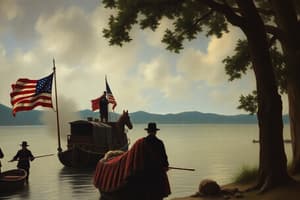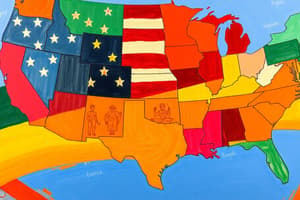Podcast
Questions and Answers
Which country did the people of Vietnam openly oppose the leadership of?
Which country did the people of Vietnam openly oppose the leadership of?
- South Vietnam (correct)
- Japan
- South Korea
- China
When did North Vietnam take control of the entire country?
When did North Vietnam take control of the entire country?
- 1975 (correct)
- 1965
- 1980
- 1990
Which organization was formed in opposition to American Imperialism in the Philippines?
Which organization was formed in opposition to American Imperialism in the Philippines?
- Anti-Imperialist League (correct)
- Imperialism-Free Society
- Imperialists United
- League of Nations
In what year did the Anti-Imperialist League fade away?
In what year did the Anti-Imperialist League fade away?
Which modern region has seen American involvement pointed out as an example of American Imperialism by historians?
Which modern region has seen American involvement pointed out as an example of American Imperialism by historians?
What territories did the United States acquire as part of American Imperialism?
What territories did the United States acquire as part of American Imperialism?
What was the main reason for the United States' failure to influence Vietnam effectively?
What was the main reason for the United States' failure to influence Vietnam effectively?
Which country's leadership did the people of Vietnam adamantly support?
Which country's leadership did the people of Vietnam adamantly support?
What territories did the United States acquire as part of American Imperialism?
What territories did the United States acquire as part of American Imperialism?
Which country's leadership did the people of Vietnam adamantly support?
Which country's leadership did the people of Vietnam adamantly support?
In what year did North Vietnam take control of the entire country?
In what year did North Vietnam take control of the entire country?
What organization was formed in opposition to American Imperialism in the Philippines?
What organization was formed in opposition to American Imperialism in the Philippines?
What was the main reason for the failure of the United States to influence Vietnam effectively?
What was the main reason for the failure of the United States to influence Vietnam effectively?
Which term best describes the view of historians on the success of American Imperialism?
Which term best describes the view of historians on the success of American Imperialism?
What modern region has seen American involvement pointed out as an example of American Imperialism by historians?
What modern region has seen American involvement pointed out as an example of American Imperialism by historians?
'American Imperialism Today' primarily discusses American involvement in which regions?
'American Imperialism Today' primarily discusses American involvement in which regions?
'American Imperialism Today' suggests that the United States invested ___________ in Iraq, Iran, and Afghanistan.
'American Imperialism Today' suggests that the United States invested ___________ in Iraq, Iran, and Afghanistan.
'American Imperialism Today' mentions that the Anti-Imperialist League faded away after _______.
'American Imperialism Today' mentions that the Anti-Imperialist League faded away after _______.
Flashcards are hidden until you start studying
Study Notes
American Imperialism
- The United States initially followed an isolationist policy under George Washington, believing that foreign involvement would lead to greater economic and political problems.
- Historically, powerful countries achieved imperialism through economic, political, and military control over weaker nations.
Reasons for American Imperialism
- After the Civil War (1861-1865), the US needed to rebuild and expand its global position.
- The US economy grew significantly during the Gilded Age (1877-1900), leading to a search for new markets to sell products.
- Motivations for imperialism included:
- Social Darwinism: a philosophy that advocated for the survival and dominance of certain individuals or nations.
- Manifest Destiny: the belief that the US had the right to possess lands between the Atlantic and Pacific Oceans.
- The Cold War: a period of competition between the US and the Soviet Union for political and economic control of the world.
Methods of Imperialism
- Economic influence
- Military intervention and intimidation
- Cultural and religious influence
Imperialism in US History
- The US broke away from Great Britain in 1776 and became an independent nation.
- The US initially did not support imperialism, but eventually spread across the continent and expanded into other countries.
- The first imperialistic practices experienced by the US were against Native Americans.
- The Treaty of Paris 1783 ended the British and Native American alliance, leaving native populations struggling to combat the growing US population.
Indigenous Wars
- The Treaty of Greeneville in 1795 attempted to maintain peace between natives of the Northwest territory but eventually failed.
- The Indian Removal Act of 1830 forced natives in the south to relocate to reservations in Oklahoma.
- Native American resistance ended by the 1900s, and they became compliant with the US government living on reservations.
Alaska and Hawaii
- The US acquired Alaska from Russia in 1867 for $7.2 million, with the goal of expanding to Canada.
- The discovery of gold in Alaska in 1898 made the purchase profitable.
- The US acquired Hawaii in 1898 after American sugarcane growers staged a coup and overthrew the Queen of Hawaii.
- Hawaii became a strategic location for the US to expand into Asian markets.
American "Diplomacy"
- The US practiced imperialism from 1900 to 1914 under the leadership of Theodore Roosevelt, William Howard Taft, and Woodrow Wilson.
- Each president approached imperialism differently:
- Roosevelt: Big Stick Diplomacy (military might and intimidation)
- Taft: Dollar Diplomacy (US business investments in foreign countries)
- Wilson: Moral Diplomacy (diplomatic means to promote democracy and capitalism)
Korean War and Vietnam
- The Korean War (1950-1953) was a proxy conflict between the US and the Soviet Union, with the US supporting democratic South Korea and the Soviet Union supporting communist North Korea.
- The Vietnam War (1954-1973) was another proxy conflict, with the US attempting to influence the Vietnamese and ultimately failing.
American Imperialism Today
- The success of American Imperialism is highly debated among historians.
- The US is still a highly influential country, with involvement in the Middle East being seen as a modern example of American Imperialism.### Alaska Purchase
- United States purchased Alaska from Russia in 1867 for $7.2 million
- Purchase was nicknamed "Seward's Folly" due to initial disapproval from Congress
- Gold discovery in Alaska in 1898 led to significant profit for the United States
- Alaska's natural resources continue to contribute to the country's financial growth
Hawaii Annexation
- American sugarcane growers staged a coup and overthrew Queen Liliuokalani in 1893
- Growers sought to overthrow the queen due to the 1890 McKinley Tariff, which increased tariffs on imported goods
- President Grover Cleveland refused to annex Hawaii, but President McKinley negotiated annexation in 1897
- Hawaii became a territory in 1900 and a state in 1959
American Imperialism (1900-1914)
- Theodore Roosevelt, William Howard Taft, and Woodrow Wilson led the United States in international diplomacy
- Roosevelt employed Big Stick Diplomacy, using military might and intimidation
- Taft employed Dollar Diplomacy, focusing on U.S. business investments abroad
- Wilson employed Moral Diplomacy, promoting democracy and capitalism through diplomatic means
Korean War
- North Korea invaded South Korea in 1950, leading to a civil war
- United States supported South Korea, while the Soviet Union supported North Korea
- The Korean War ended in 1953, with the country remaining divided at the 38th parallel
Vietnam War
- Vietnam was split into communist North Vietnam and democratic South Vietnam in 1954
- United States supported South Vietnam, but failed to influence the country, leading to North Vietnam's control in 1975
American Imperialism Today
- Debate surrounds the success of American Imperialism
- Critics argue that acquisitions like Hawaii, Alaska, and Puerto Rico came at a high cost
- Modern examples of American Imperialism include involvement in the Middle East, with investments in Iraq, Iran, and Afghanistan
Studying That Suits You
Use AI to generate personalized quizzes and flashcards to suit your learning preferences.




